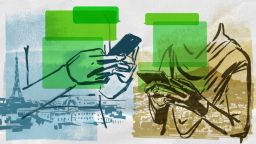The Taliban said Monday it had dissolved Afghanistan’s election commission as well as its ministries for peace and parliamentary affairs, further eroding state institutions set up by the country’s previous Western-backed governments.
The Independent Election Commission (IEC) was established in 2006 – five years after the Taliban was overthrown by a US-led coalition – and tasked with monitoring elections and referendums.
“Now we have reached peace so no need for those,” deputy spokesman for Afghanistan’s Taliban-run government Bilal Karimi told CNN.
After the Taliban swept through Afghanistan this summer amid a chaotic withdrawal of US troops, the fundamentalist Islamist group reversed a series of measures aimed at boosting the country’s democracy.
In September, the group replaced the country’s women’s ministry with the Ministries of Prayer and Guidance and the Promotion of Virtue and Prevention of Vice. The new ministry oversees the Taliban’s morality police, enforcing the group’s ultra-conservative interpretation of Islamic Sharia law.
Earlier this month, the United Nations released a report documenting what it called a “rapid reversal of (women’s) rights” in Afghanistan.
“When the Taliban seized power in August, their initial statements included assurances that women would be allowed to exercise their rights within Islamic Law, including their right to study and work,” the report by UN Women said. “However, despite these verbal commitments, women and girls are seeing a rapid reversal of their rights.”
It added that women were reporting increased restrictions on “freedom of movement and expression, access to life-saving services, information, protection, education, employment and livelihood opportunities.”
Afghanistan is in the midst of what the UN has called a “profound humanitarian crisis” including a collapse of the banking system and a severe liquidity crisis.
Most countries have yet to formally recognize the new Taliban government over fears may re-impose some of the more extreme draconian measures – including public executions and floggings – that it enforced when it first came to power in the 1990s.
CNN’s Tamara Qiblawi contributed to this report.

